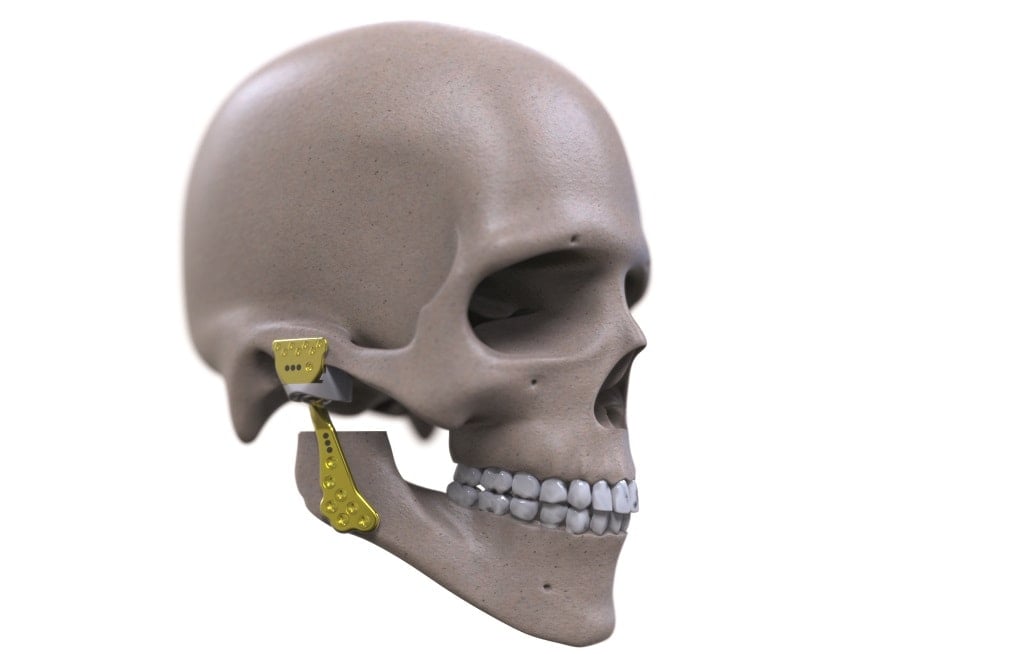![Engimplan implant [Image: Engimplan]](https://fabbaloo.com/wp-content/uploads/2020/05/Engimplanimplant_img_5eb093057c952.jpg)
Belgium-based Brazil has strategically invested in Brazil-based Engimplan.
The investment is strategic in several ways: first because that’s what industry likes to call such investments; second, Materialise has acquired a 75% stake in the company; third, global healthcare expertise is providing more areas with local care.
Engimplan
Engimplan was established in Rio Claro in 1992.
The company creates — from development through sales — orthopedic and cranio-maxillofacial (CMF) implants and instruments, both standard and patient-specific.
These decades of operation have led the Engimplan team to develop strong expertise in the needs of this market. And they have continued to grow this expertise, remaining aware of the latest offerings and needs in medical solutions — including 3D solutions.
The company notes:
“Aware of its role in society and its mission as a purveyor of solutions for the medical field, Engimplan is in the leading vanguard of new product development, pioneering the personalization of implants, tailored to each patient and always taking into consideration their health and their full and continued participation in life. In 2018, Engimplan realized revenue of €6.2 million with an EBITDA margin of 39%.”
The growth and targeting of this business strategy places it squarely in Materialise’s sights, fitting neatly with the company’s focus on developing personalized medical solutions.
Investment
![Engimplan implants [Image: Engimplan]](https://fabbaloo.com/wp-content/uploads/2020/05/Engimplanimplants_img_5eb09305d88f4.jpg)
Materialise, for its part, has almost 30 years’ experience in developing patient-specific healthcare solutions.
Working with both 3D imaging and 3D printing among its medical portfolio offerings, Materialise has become a go-to solution in hospitals both near its Leuven HQ and on different continents. One of the biggest benefits of bringing 3D solutions to the table lies in localization: bringing healthcare to the point of care.
And the point of care for Engimplan is in Brazil. With the Belgian company investing directly into this company, it is investing into the future of Brazilian solutions for and access to advanced medical implants and instruments.
Once the transaction fully closes early this month, the announcement notes that “Materialise will gain access to Engimplan’s local production facility; expand Engimplan’s portfolio with its 3D printed implants and expertise; and enter the company’s existing partner and distribution network in Brazil.”
“This investment by Materialise sends a strong signal to our customers and the industry that we remain committed to developing our innovative solutions that improve the lives of many people, and that we have the confidence and support of a pioneer and global leader in 3D printing,” says José Tadeu Leme, CEO of Engimplan. “Together, we can introduce new levels of innovation in the development of personalized implants in Brazil.”
Global Expertise For Local Care
Along with the announcement, Materialise has released a blog from Brigitte de Vet, Vice President and General Manager of Materialise Medical.
Her thought piece centers around the idea of 3D printing “transforming global expertise into local care” — just as is happening with this international investment.
We often see hives of activity serving as the hubs of development. For Industry 4.0, much of the activity is taking place in central locations in Europe and in the US, where specific cities tend to attract talent and serve as the headquarters of a number of operations. Above all though, Industry 4.0 is seeing a digital transformation — which enables distributed operations. The buzzwords here tend to be “democratization” and “localization”.
Both of these, buzzy as they may be, are taking place as 3D printing and other 3D technologies become more of a mainstay in modern medical care.
Taking expertise born of Belgian innovation, Brazilian providers will be able to leverage outside learning for local patients.
“In today’s digital world, medical and manufacturing expertise is scattered around the globe, but when we consider the delivery of care, we want to be as close to the patient as possible. 3D printing has the potential to deeply modify the delivery of healthcare by transforming global expertise into local care, helping to reduce production costs and improving delivery times. Hospitals around the world recognize the added value 3D printing brings to personalized patient care. As a result, an increasing amount of hospitals have integrated 3D printing in their medical offering and are creating point-of-care 3D printing facilities,” de Vet writes.
“The ability to manufacture locally means that we are no longer encumbered by the need to drive economies of scale, reducing costly inventories and allowing just-in-time production.”
The conclusion of her blog puts this particular investment activity into a broader context for both Materialise’s individual strategy and growth in the digitizing healthcare industry:
“Today, we are taking another step forward with a strategic investment in Engimplan LTDA, a Brazil-based manufacturer of orthopedic and Cranio-Maxillofacial (CMF) implants and instruments. The combination of Materialise’s expertise in 3D printed medical solutions with Engimplan’s innovative product portfolio will help to accelerate the introduction of 3D printed, patient-specific implants and instruments in the Brazilian market. By introducing an inherently digital manufacturing technology into the production process, Brazilian patients will benefit from advanced local care that builds on Materialise’s experience in developing certified medical solutions, which spans nearly three decades and sits thousands of kilometers away. As a result, this investment will not only create significant product innovations by introducing new levels of innovation in the development of personalized implants in Brazil, it will also support important process innovations by bringing personalized care closer to the Brazilian patient.”
Via Materialise











FELIXprinters has released a new bioprinter, the FELIX BIOprinter, which is quite a change for the long-time 3D printer manufacturer.